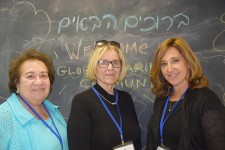JCHC Participates in U.S.-Israel Conference on Aging and Hope With Life's Door in Jerusalem

West Orange, NJ, June 20, 2017 (Newswire.com) - After several years of planning and overseas collaboration, a contingent from northern New Jersey's Greater MetroWest area traveled for the first time to Life’s Door (G’isha Chaim) in Jerusalem, Israel in May to attend “Compassion and Hope in Aging, Illness and at Life’s End.” The Jerusalem-based organization is dedicated to promoting spiritual care to the elderly and chronically or terminally ill. Among the attendees from the U.S. were Laurie Loughney, COO of the Jewish Community Housing Corporation of Metropolitan New Jersey (JCHC) and Cecille Asekoff, executive director of the Joint Chaplaincy of the Jewish Federation of Greater MetroWest, plus representatives from other MetroWest partner agencies. The JCHC and the Jewish Federation of Greater MetroWest are based in West Orange, N.J.; the Greater MetroWest region comprises Essex, Morris, Sussex, Union, and parts of Somerset County.
The conference was part of the Creating a Caring Community initiative that started about three years ago between Life’s Door and the Joint Chaplaincy. Until now, lectures and training workshops have been held in New Jersey with Life’s Door co-founders Dr. Benjamin Corn and his wife, Devora Corn. The relationship between the Joint Chaplaincy and Life’s Door began about 13 years ago when the former received a grant to bring spiritual care to Israel. Over the years, the Joint Chaplaincy has been training people in pastoral care and to become certified spiritual care providers.
It was so enriching for us all to share our different approaches to spiritual and physical care of the elderly .... I'm looking forward to introducing some of the spiritual care modalities I learned from our partners in Israel, particularly in our new Memory Care Suite at the Lester Senior Housing Community.
Laurie Loughney, Chief Operating Officer
“In prior years, training and planning had been solely on the director level, and Israeli practitioners have been presenting at our conferences here in New Jersey,” explained Asekoff. “Through our shared vision, we were able to make this particular trip happen, bringing together clinicians, chaplains, and elder care and health care providers.”
The JCHC’s Loughney found tremendous value from the conference sessions and through the relationships forged with her Israeli counterparts.
“It was so enriching for us all to share our different approaches to spiritual and physical care of the elderly,” said Loughney. “I’m looking forward to our continued collaboration as we all expand our views of health care and spiritual care for our seniors.” The JCHC owns and manages four senior living communities in Essex and Morris counties with independent, assisted living and memory care options, and offers a wide range of programs to support the mind, body and spirit of its residents.
Asekoff said a major differentiator is in how the two countries and cultures approach care from a Jewish perspective, specifically around Jewish ritual and pastoral care. In Israel, ritual and religious aspects of care are ingrained in the Jewish state’s culture but pastoral care is something new.
“In the United States, the care provider—whether a chaplain, an agency or institution—will incorporate ritualistic elements into care,” said Asekoff. “In Israel, the country’s rhythm is a Jewish rhythm; those things are organic to the calendar and the lifestyle and happen naturally. However, the U.S. has a long-time pastoral care tradition which has not been the case in Israel, so we’ve been cross-training our professionals.”
According to Devora Corn, the idea behind Creating a Caring Community was to develop a model for collecting data that informs how to train people better, and create programs that bring hope to patients and the elderly, and provide better spiritual care within communities. “We are all learning how to train pastoral volunteers, how to prevent professional burnout, and to create programs around hope,” said Corn. “By bringing people together in these workshops, we can all become more innovative in our health care practices.”
She noted that not all spirituality is religious in nature, especially for more secular segments of the population. She sees the shift in U.S. medicine toward being more integrative and promoting mindfulness as a positive trend that can inform Israel’s growing chaplaincy movement. She and her husband are currently working on initiatives to study the neuroscience of hope.
“We need to meet people where they are on the religious and the spiritual spectrums, and address issues of compassion fatigue for caregivers as well as fostering the spiritual needs of the chronically or terminally ill,” she said. “The hospice movement in the States does that very well; it’s something we are learning in Israel, thanks in part to our MetroWest partners.”
Loughney added that as people live longer and their physical and emotional needs change, care providers and senior housing communities must evolve to meet those changing needs. She noted that aging with dignity is especially important in delivering supportive services to seniors.
“Our seniors come from diverse backgrounds, with many different needs that we are meeting with our programs and service offerings,” said Loughney. “I’m looking forward to introducing some of the spiritual care modalities I learned from our partners in Israel, particularly in our new Memory Care Suite at the Lester Senior Housing Community.” The Whippany residence recently opened a memory unit in its assisted living residence, offering patient-centered care for older adults with dementia-related diagnoses.
Askeoff said that the partnership with Life’s Door continues with discussions about video conferences, sharing case studies, and finding ways to bring interactive Café Europa-style programs to seniors in both countries. “Chaplaincy and spiritual care do not belong on one continent. The opportunity to build and cultivate meaningful professional ties with Life’s Door has strengthened our tool kit and inspired us all.”
Loughney agreed. “Every day, we at the JCHC are challenged with finding new and better ways to enable our seniors to age with dignity. Our week in Israel was filled with ideas for creating a more comfortable and comforting environment for our residents that I’m excited to implement in our communities.”
For more information about the JCHC communities’ housing options, amenities and services, visit www.jchcorp.org.
###
About the Jewish Community Housing Corporation of Metropolitan New Jersey
Founded in 1983, the Jewish Community Housing Corporation of Metropolitan New Jersey (JCHC) owns and manages more than 470 apartments in four buildings for older adults in Morris and Essex counties in northern New Jersey. The non-profit organization offers seniors a range of options in terms of services, amenities, location, and cost, all within a traditional Jewish environment. The JCHC provides housing, programs, and services for the independent elderly as well as those who need assisted living and memory care. For more information, go to www.jchcorp.org.
Source: Jewish Community Housing Corporation of Metropolitan New Jersey
